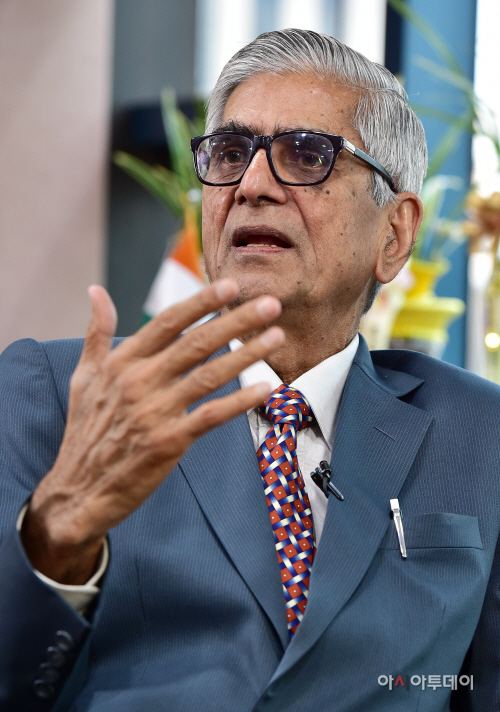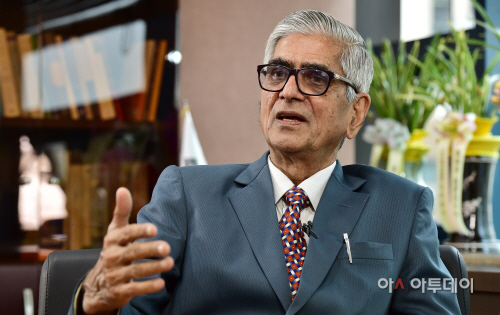 D.R Mehta, the founder of the Jaipur Foundation/ Photograph by reporter Lee Byung-hwa (photobolbh@) D.R Mehta, the founder of the Jaipur Foundation/ Photograph by reporter Lee Byung-hwa (photobolbh@) |
AsiaToday Reporter Kim Si-young = "If South Korea's excellent IT technology is combined with prosthetic fabrication technology in India, millions of disabled people around the world who need a prosthetic leg will enjoy the amazing benefits," said D.R. Mehta, the founder and chief patron of the Jaipur Foot Foundation, on May 18.
He said, "If Korea's IT technology can be combined, we could supply prosthetic legs that costs up to $20,000 for each for only $200. This will give people with disabilities freedom of movement and economic freedom, and eventually let them restore human dignity."
Dr. Mehta is former Deputy Chairman of the Reserve Bank of India and former Securities & Exchange Board of India chief. He served as the Adviser to Prime Minister of India on Economic Affairs. He is now leading one of the world's largest organizations for handicapped and conducting research projects with MIT, Stanford University and Harvard University.
The following is the interview with Dr. Mehta.
Q. What's the meaning of the launch of the Jaipur Foundation in Korea?
A. The most important thing is the cooperation in the field of disability between the two countries. It's the starting point of humanistic activities that help the disabled in the two countries, as well as all over the world who will enjoy the same benefits eventually. It's also the main purpose of the foundation. Korea has one of the best technology in the electronics field. Electronic functions in the fields of prosthetic leg, prosthetic hand, and artificial joint will be strengthened with the cooperation of Korea. There are millions of people with disabilities in the world who could be benefited through mutual cooperation between the two countries. I know that Korean government would give emotional and financial assistance. Korea is a land of opportunity. Korea's conglomerates are also preparing for cooperation.
Q. What are your activities and plans in other countries?
A. We are running emergency relief camps in 40 countries around the world. The foundation diagnoses 60,000 patients and provides artificial legs to nearly 23,000 people every year. No other organizations in the world provide 2000-3000 prosthetic legs. We make prosthetic legs and provide treatments as well. We give supports to polio patients with brace appliances. We provide a variety of brace appliances such as wheelchairs and bicycles for the disabled.
Q. How did you raise fund to establish the foundation?
A. When the foundation was established in 1975, there were over 30 prosthetic feet manufactures. India has been developing prosthetic feet manufacturing technology for a long time. Indian prosthesis are in a good quality and yet affordable. Of course, these prosthetic legs were provided to the poorest in India. The government, large companies, SMEs, and sponsors gave a big help. There is passion and empathy for the organization to endure and grow up.
Q. Sponsorship of large companies and public interest seems to be necessary. What about people's interest in the foundation in India since the foundation's establishment?
A. At first, it was just a small and humble organization. When patients came, we didn't reject them and provided them prosthetic legs within three days. It hurts when we look at the patients' sad face, but it's worthwhile looking at their happy faces walking with prosthetic legs. It's incredible to see the moments of changes. You can't put a price on this impression. The biggest gift is a delight.
 D.R Mehta, the founder of the Jaipur Foundation/ Photograph by reporter Lee Byung-hwa (photobolbh@) D.R Mehta, the founder of the Jaipur Foundation/ Photograph by reporter Lee Byung-hwa (photobolbh@) |
Q. What are relief and support activities for amputees around the world?
A. Afghanistan is the most dangerous region in the world. Eight months ago, we provided a prosthetic leg for 600 people while staying for three weeks. Also, the Jaipur Foundation built two foundations in Pakistan regardless of political confrontation between Pakistan and India. We also produce prosthetic legs in Iraq, contributing to world peace.
Q. What is the 3D printed prosthetics R&D project jointly promoted with Korea?
A. We are discussing with Korea's 3D Printing Association. Cooperation between the two countries is needed for 3D printing cooperation. The socket part where cut surface and prosthetic leg meet is important. With 3D printing, the production time will shorten dramatically and benefits will increase thanks to increased production. We are in the process of signing the memorandum of understanding. The essential part is the strategy of maintaining the current lowest price with Korea's 3d printing.
Q. Please give us the details of the two international camps in the process.
A. India has systems where a team comprised of doctor, technician, and nurse go out for emergency relief camps. We will open doors for people with disabilities in Korea who want to learn how to manufacture artificial legs so they can participate.
Q. Technology of the Jaipur Foundation is excellent. What's the secret?
A. The key is based on the innovative spirit of India. It's important to think from the perspective of people with disabilities. The price is way cheaper than you could imagine. I bet it's the lowest price in real life where a single prosthetic leg costs more than 10 million won.
After Mother Teresa came to visit the foundation, people from her hometown and region came to receive prosthetic legs with perfect understanding. After all, the thing is how effectively can you help people in need.
People will come to you if it's effective. Because we provide it for free, everybody wants our prosthetic legs. Patient-centered management skill is also important. Doctor-centered management is common, but we are patient-centered.
Technology allows people with disabilities move just like non-disabled people. Technology allows artificial legs look as natural as real ones. We are putting efforts to decrease the manufacturing cost. A prosthetic leg that can be made at $50 is sold in the United States at $12,000.
Many developed countries in the world produce prosthetic legs, too. But Jaipur foot is the only prosthetic leg that lets user sit with his legs half-crossed as one of traditional ways of sitting in Asian regions. It costs only 0.1% of the ones in the US in terms of money. Its excellence is proved by leading US universities.
Q. You were a career bureaucrat. Why did you establish a foundation?
A. There was an accident. The doctor said I was going to die and that I had to cut my leg. I was young by then, and they gave me a new chance, so I was laying in my hospital bed for five months seeking for other solution. I didn't cut my leg. My knees are slightly uncomfortable. Through my personal experience, I came to think about patients who need prosthetic legs, so I came to think how to help them. I realized that hope is important for people who don't want to lose their legs. After four years, I established a foundation and resigned from the government service. Looking at people restoring their freedom and dignity like the non-disabled, and being engaged in an economic activity is my driving force."
Q. Please compare the welfare projects between Korea and India for the disabled in governments and private sectors.
A. All persons with disabilities face the same problem. Most of them are poor. They lose their legs in the hospital. Their economic level drops further. Giving a prosthetic leg to those disabled ones who sank into poverty will raise their economic power. We need to help all the people with disabilities in the world with passion. Although system is different, it can be accepted easily because Indian welfare and rehabilitation system is highly compatible with Korean's.
Most Read
-
1
-
2
-
3
-
4
-
5
-
6
-
7





















